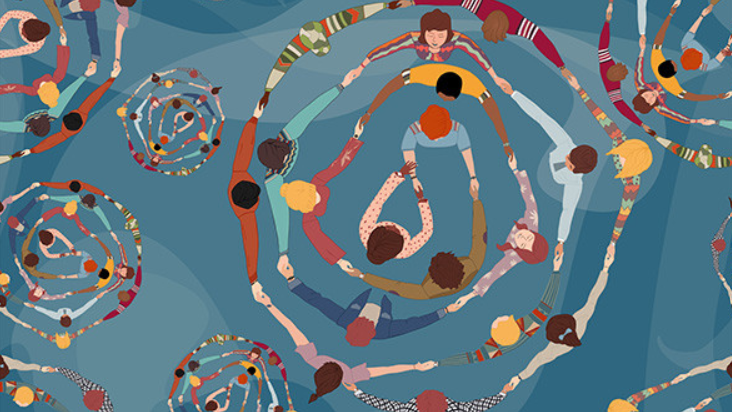[News] Healing Systems

By Laura Calderon de la Barca, Katherine Milligan & John Kania Feb. 12, 2024
How recognizing trauma in ourselves, other people, and the systems around us can open up new pathways to solving social problems.
As Brazilian author Paulo Coelho writes, “You drown not by falling into a river but by staying submerged in it.” This is an apt metaphor for how trauma impacts people, individually and collectively. Humanity is submerged in layers of individual, intergenerational, and collective trauma, but we generally don’t recognize it. This prevents us from addressing the roots of collective challenges we face and keeps us from taking steps toward healing that can transform the systems around us.
Trauma is a near-universal part of the human experience and an invisible force contributing to the “stuckness” of virtually all social systems—including child welfare, criminal justice, education, health care, and housing—even as humanity barrels headlong into the most destructive systemic breakdown of all: the climate crisis that threatens life on Earth.
Yet the impact of trauma remains all but absent from mainstream discourse about systems change. Part of the reason is that we have a common tendency to believe trauma is “out there”—that other people are traumatized and need help, but we’re fine—when in fact we all carry trauma. The trauma we carry affects the way we look at the world and ourselves, and therefore plays a role in determining the future course of social systems. Unless we acknowledge trauma, engage with it, and find ways to support individual and collective healing, our systems will stay stuck.
Over the past year, we have been working with a multidisciplinary coalition of partners led by The Wellbeing Project and Georgetown University to apply insights from the field of trauma healing to the practice of systems change. Dozens of social change, Indigenous, and community leaders working in different systems in geographies as varied as Sri Lanka, Romania, Australia, New Zealand, Canada, Colombia, India, and the United States shared their time and experience with us in the hopes of helping the social sector forge a common language around trauma and advocate for collective healing as integral to the work of systems change.
“Our systems don't recognize how trauma impacts people, and as a result decision makers in those systems create trauma and hold people in a space of trauma,” Allison Wainwright told us. Wainwright is the CEO of Family Life, one of Australia’s largest family services providers working with vulnerable children and their families. “If we don’t talk about it and acknowledge it, then it’s very difficult to bring about change,” she added.
Seeing individual, intergenerational, collective, and historical trauma for what they are—powerful forces to reckon with in our present-day systems—and moving discussions about trauma from the margins to the mainstream can help the social sector discern new and effective approaches to systems change.
-
Date
Aug 19, 2024
-
By
Stanford Innovation Review
Newsletter
Sign up for the Healthy Aging CORE BC e-news to keep up-to-date with activity from the platform and the Community-Based Seniors Services (CBSS) sector across the country.
